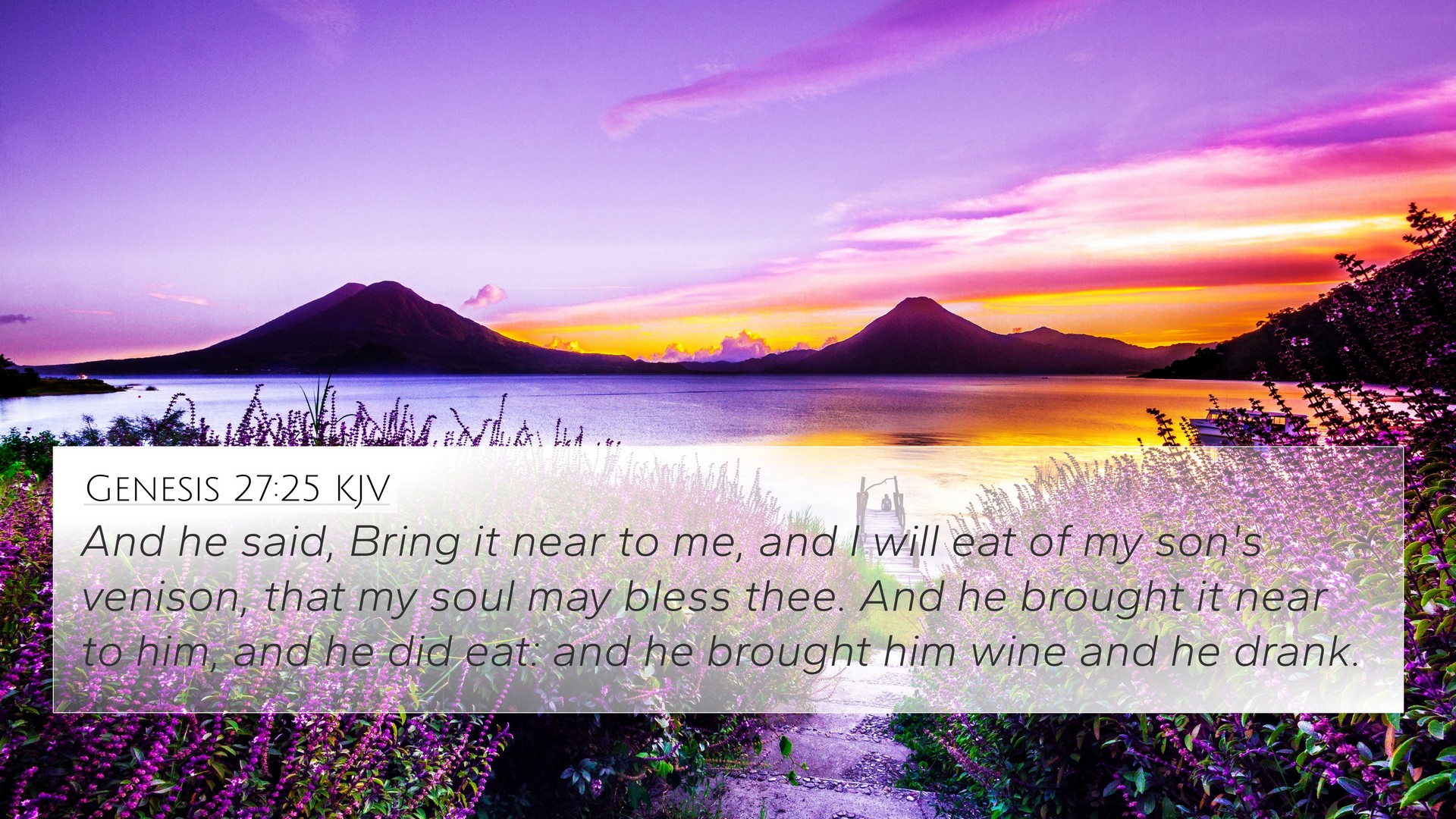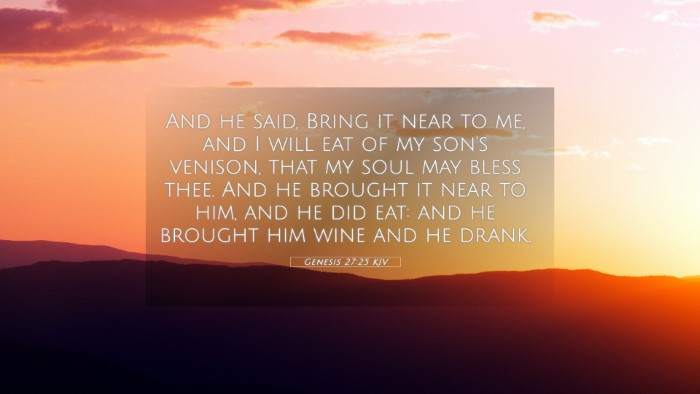Understanding Genesis 27:25
Verse: "And he said, Bring it near to me, and I will eat of my son's venison, that my soul may bless thee. And he brought it near to him, and he did eat: and he brought him wine, and he drank."
Summary of Genesis 27:25
This verse recounts a significant moment in the biblical narrative where Isaac, the patriarch, seeks to bless his son before he passes away. The act of eating venison symbolizes not only a familial connection but also the seriousness of the blessing that is about to be conferred.
Thematic Connections
The verse illustrates themes of deception, family dynamics, and the importance of blessings in biblical culture. It showcases a pivotal moment where Jacob, disguised as Esau, presents venison to his father, Isaac, in an attempt to receive the blessing intended for his brother.
Interpretations from Public Domain Commentaries
- Matthew Henry: He highlights that Isaac's request indicates trust in physical food to bring a spiritual blessing. The deception surrounding Jacob’s actions illustrates human frailty and the complexities of familial relationships. The act of sharing a meal before blessing signifies communion and the role of food in covenantal relationships.
- Albert Barnes: Consideration is given to the manner in which Isaac, despite being physically impaired, seeks to bless. He notes that Isaac’s desire for venison links to a broader narrative of reliance on sensory experiences that reveal deeper truths about discernment and recognition of God’s will amidst human schemes.
- Adam Clarke: Clarke emphasizes the significance of the words spoken during the blessing, indicating that they embodied prophetic power. The spiritual dimension behind the physical act of eating and drinking underscores God’s sovereignty in deciding the heir despite human interventions and schemes.
Cross-References and Related Verses
Genesis 27:25 is deeply connected to various other scripture that enhance its thematic and narrative significance.
- Genesis 27:1-4: The context of Isaac's physical blindness and his intention to bless Esau.
- Genesis 27:18-19: Jacob's approach to Isaac, showcasing the deception involved.
- Genesis 27:28-29: The actual blessing received by Jacob, which adds depth to the consequences of the deception.
- Hebrews 12:16-17: Reflects on Esau’s loss of his birthright and the bitterness that ensues from a moment of impulsivity.
- Romans 9:10-13: Paul addresses the sovereignty of God's choice of Jacob over Esau, echoing the themes of divine election seen in this blessing.
- Matthew 5:9: Offers insight into willingness to reconcile, contrasting the discord seen in Isaac’s family.
- Proverbs 27:14: Speaks to the impact of blessings and curses, highlighting their weight in human relationships.
- 1 Chronicles 5:1-2: Reiterates Jacob’s role as the chosen lineage, linking further back to Isaac’s blessings.
- Galatians 3:29: Explores the concept of spiritual inheritance in connection to the promises given to Abraham’s seed, which includes the blessings given in Genesis.
- James 1:17: Discusses the nature of good gifts from above, paralleling the significance of blessings sought in Genesis 27.
Practical Applications and Reflections
The events seen in Genesis 27:25 prompt readers to reflect on how we seek and give blessings within our families and communities. The importance of intention, authenticity, and spiritual connection is highlighted through Isaac’s actions and Jacob’s intentions.
In a modern context, how do we ensure that our blessings are given and received with sincerity and without the shadows of deception or rivalry? How can we better understand the weight of our words, especially when bestowing blessings?
Conclusion
Genesis 27:25 serves as a vital narrative not only within the story of Isaac, Jacob, and Esau but also in illustrating the complex dynamics of blessings in biblical tradition. Understanding this verse through the lens of cross-referenced scripture deepens our appreciation for the themes of divinely ordained purpose, familial loyalty, and the weight of spoken words.
Further Study and Resources
For those interested in exploring the concepts of blessings and the dynamics of inter-biblical dialogues between these themes, utilizing tools for Bible cross-referencing such as a Bible concordance or cross-reference guide can be incredibly beneficial. Engage in a cross-reference Bible study for a comprehensive understanding of related themes and narratives.
Utilizing a Bible cross-reference system allows for deeper thematic analysis and comparisons that link various scriptures across both the Old and New Testaments.



